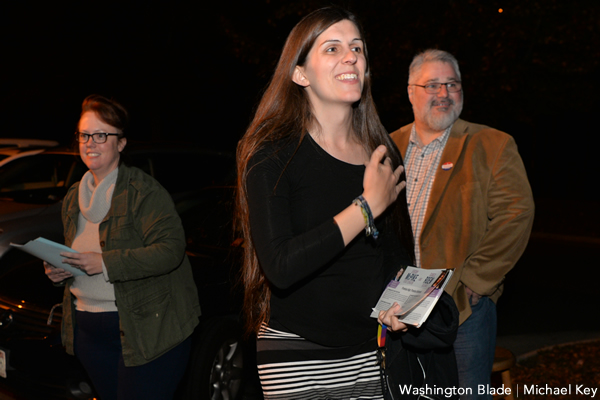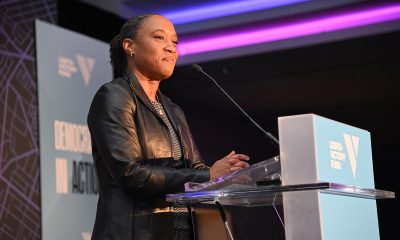Virginia
Trans lawmaker impacted by Va. redistricting changes
Roem placed in new district, will address political future after session ends

Sweeping changes in Virginia’s state legislative and congressional districts brought about by a redistricting order issued on Dec. 28 by the Virginia Supreme Court have significantly changed the makeup of the Manassas area district of Virginia House of Delegates member Danica Roem (D).
In 2018, Roem became the nation’s first out transgender person to be seated in a U.S. state legislature after she defeated longtime Republican incumbent and LGBTQ rights opponent Bob Marshall in the November 2017 election.
Roem, who is one of four out LGBTQ members of the Virginia General Assembly, appears to have been impacted the most by the redistricting among her three LGBTQ colleagues.
Gay state Sen. Adam Ebbin (D-Alexandria), gay state Del. Mark Sickles (D-Fairfax County), and lesbian state Del. Dawn Adams (D-Richmond area) were assigned new districts that retained most of their existing Democratic constituents or include new Democratic leaning areas, according to sources familiar with their districts.
State Del. Joshua Cole (D-Fredericksburg area), who identifies as bisexual, ended his tenure as a delegate this week after losing his re-election bid in the November election to Republican Tara Durant by 647 votes. The state’s redistricting changes place both Cole and Durant in a newly created 65th District that Stafford County Democratic Party activist Matt Rowe said makes the highly competitive district slightly more Democratic leaning.
Rowe said Cole, who the Blade was unable to reach for comment this week, indicated he plans to run again for the delegate seat in the next election.
The Virginia Supreme Court assumed the responsibility of redrawing the state’s congressional and state legislative districts under a state constitutional amendment approved by voters in a 2020 referendum. The redistricting measure approved by voters assigns the authority of creating the new districts to a bipartisan redistricting commission made up equally of Democrats and Republicans.
But the commission became deadlocked after each of the two-party representatives was unable to agree on a redistricting plan. Under a provision of the redistricting law, if the commission cannot reach an agreement, the matter is sent to the state Supreme Court, which appointed two redistricting experts called masters to redraw the state’s congressional and state legislative district maps to conform with population changes determined by the 2020 U.S. Census. One of the masters was selected by Democrats and the other by Republicans, according to a statement released by the court.
“We drew maps which did not unduly favor either party,” special masters Sean Trende and Bernard Grofman said in a statement. “These maps came about as part of a partisan and incumbency blind process based on good government map making,” the two said.
The changes made by the two masters carved Roem’s existing District 13 into three new districts – District 20, 21, and 22. Roem, who lives in the new District 20, is now the state delegate representing that district. Under rules established under the new redistricting law approved by voters, all the new districts took effect immediately on Dec. 28.
In response to a request by the Blade for her assessment of these changes, Roem said her new district consists of just six and a half of the 18 voter precincts that made up her former District 13. The other two-thirds of the precincts in her new district include residents that she had not represented before in Prince William County.
It couldn’t immediately be determined whether her new constituents are mostly Democrats, Republicans, independents, or a mix of all three.
“I live in the new House District 20 and will deal with my political future after this year’s Virginia General Assembly session ends in March,” Roem told the Blade in an email message.
“I’m confident the people of greater Prince William would continue to support me as a lifelong Prince William County resident from Manassas who served as their newspaper reporter for more than nine years from 2006-2015 before earning three terms now to serve them as a member of the Virginia House of Delegates,” she said.
“During my first two terms in office, the governor signed 23 of my bills into law – all with bipartisan support – including three bills to advance LGBTQ equality, so I’ve been effective at delivering for all of my constituents, LGBTQ residents included,” Roem said.
Gay Democratic activist Jim O’Connor of Prince William County, where Roem’s new district is located, said he believes the voter makeup of the new district would likely make it possible for her to win re-election in 2023 or possibly in 2022. Rowe, who said he also follows Prince William County politics, said he too thinks Roem is in a good position to win re-election whether in 2022 or 2023.
A lawsuit filed in federal court by some redistricting opponents is calling for a special House of Delegates election in 2022 on grounds that the redistricting resulted in large numbers of residents being represented by lawmakers they had no opportunity to vote for in an election, which may be in violation of the U.S. Constitution. The lawsuit is expected to be resolved sometime early this year to make it known whether a special Virginia House of Delegates election will take place this year in addition to the regularly scheduled election in 2023.
Virginia
Freddie’s to hold ‘Love Fest’ Drag Story Hour after bomb threat
Arlington gay bar receives outpouring of support from community

Freddie’s Beach Bar and Restaurant, the Arlington, Va. LGBTQ establishment, has announced it is hosting a “Love Fest” celebration on Saturday, May 4 that will include a Drag Queen Story Hour brunch in response to a bomb threat that interrupted the first Drag Story Hour event it hosted four weeks earlier.
“Help us stop the hate,” a flier announcing the May 4 Love Fest event says. “Join us for our next story time brunch, dressed in your favorite Rainbow/Hippie outfit,” the flier says. “Carry your homemade signs of support.”
Freddie Lutz, Freddie’s Beach Bar owner, said a portion of the proceeds of the event will be donated to local LGBTQ charities.
Lutz has reported that separate email messages with a bomb threat were sent to the Freddie’s in the Crystal City section of Arlington, the Freddie’s Beach Bar in Rehoboth Beach, Del., and to him personally with a threat targeting his and his husband’s house located near the Freddie’s in Crystal City.
He said the first threat arrived about an hour before the April 6 Drag Story Hour was scheduled to begin, with drag queen Tara Hoot scheduled to read children’s stories to what Lutz said was a large turnout of kids with their parents and family members. After asking all patrons to exit the bar into its rear outdoor seating area and parking lot, Arlington police conducted a thorough search of the premises with a bomb sniffing dog and found no trace of a bomb.
All customers, including parents and their children, were invited back inside and the show took place as planned, with drag performer Hoot describing the event as a display of “fun and love and joy.”
Lutz has said the May 4 Love Fest event, which is scheduled to begin at 11 a.m., is intended to show the community and those responsible for bomb threats at many of the past Drag Story Hour events, that these events enjoy strong community support.
“They’re trying to scare us and intimidate us, and I just don’t think as a community we can allow that to happen,” he told WUSA 9 TV News. “It emboldens me to just carry on,” he said.
He told the Washington Blade he and his staff are honored that they have received an outpouring of support from community organizations, other nearby businesses, and government officials.
The Arlington County Board, which is the governing body of the county, voted unanimously on April 9 to approve a statement supporting Freddie’s Beach Bar and the LGBTQ community in response to the bomb threat incident.
“Arlington County and the County board unequivocally support the LGBTQ+ community,” the statement says. “Arlington County Police Department’s swift response ensured the safety of patrons and staff, and the fortitude of Freddie and drag queen Tara Hoot allowed the show to go on,” the statement continues.
“With protests, threats, and violence targeting the LGBTQ+ community – and drag shows in particular – on the rise across the country, expressions of hatred and bigotry have absolutely no place in our community, and the Arlington County Board condemns these threats of violence and attempted intimidation of our community,” it says.
Virginia
Norfolk transgender resource center vandalized
Anti-trans graffiti spraypainted onto Southeastern Transgender Resource Center’s windows

The Norfolk Police Department is investigating the vandalism of a transgender resource center’s building.
Tarena Williams, founder of the Southeastern Transgender Resource Center, told WAVY that someone spraypainted anti-trans graffiti on the windows of her organization’s offices on Sunday or Monday morning. Williams told the Hampton Roads television station that seeing the messages was like “walking into hell.”
“I opened up STRC, even the Lamina House,” she told WAVY. “I opened up that to get away from those types of words. This is a place you can come to get away from that, but to see that sprayed over the window. It’s kind of like you are walking into hell. … To be honest, I was like in shock.”
Authorities are investigating the vandalism.
Virginia
Bomb threat interrupts Drag Story Hour event at Arlington gay bar
Event resumed after police, bomb sniffing dog search of Freddie’s Beach Bar

A Drag Story Hour event hosted by the Arlington, Va. gay bar and restaurant Freddie’s Beach Bar was interrupted by a bomb threat sent by email on Saturday, April 6, requiring parents and their children attending the event to exit the bar into its rear outdoor seating area and parking lot until police and a bomb sniffing dog searched the premises and found no trace of a bomb.
Freddie Lutz, owner of Freddie’s Beach Bar, located in the Crystal City section of South Arlington, said the threatening email from an unidentified sender came during the first time he has hosted a Drag Story Hour event, which includes a drag performer reading children’s stories to children accompanied by their parents.
“We had a lot of neighborhood families with kids and babies and one grandmother in there,” Lutz told the Washington Blade. “It was a great turnout, and we had to push them all out to the back parking lot,” he said. “And they waited, which I thanked them for, until the coast was clear. And then they came back in.”
Lutz said that two protesters opposed to the drag event showed up outside Freddie’s on Saturday, at the time of the Drag Story Hour event. He said drag performer Tara Hoot, who conducted the Drag Story Hour at Freddie’s, told him before the event started that some of her previous Drag Story Hour events have been targeted with bomb threats and protesters.
“So, we were kind of prepared or I guess you could say psychologically prepared for it,” Lutz said. “And sure enough, we got an email threatening the bar and also me personally at my residence, which was a little unsettling,” he said, adding that nothing was found at his nearby South Arlington house.
In response to an inquiry from the Blade, Arlington police released a brief statement about the incident.
‘At approximately 11:15 a.m. on April 6, police were dispatched to the report of a bomb threat emailed to a business,” the statement says. “Responding officers made contact with the occupants, conducted a sweep of the business and found no evidence of criminal activity located at the restaurant during the sweep,” it says. “The investigation into the threat is ongoing.”
Hoot, who has been conducting Drag Story Hour events in the D.C. area for more than a year, said as many as eight of her past events have been targeted by hostile protesters or bomb threats, although no bombs have ever been found at the locations where the events have taken place.
Hoot said like protesters targeting her previous events, the two protesters at the Freddie’s event, a man and a woman, cited their religious believes as their reason for opposing the Drag Story Hour event.
“They were spewing religious hate,” Hoot told the Blade. “They were trying to shame parents for bringing their kids.”
Hoot said she includes in the performances songs of interest to children and reads from children’s books such as the Very Hungry Caterpillar, a book that talks about bravery and other positive themes. “And then I give them bubbles and rainbow ribbons and we all color together,” she said. “It’s just fun and love and joy.”
Started in San Francisco in 2015 by an organization called Drag Story Hour, the story hour events have taken place across the country in libraires, bookstores, and venues such as restaurants and bars.
“In spaces like this, kids are able to see people who defy rigid gender restrictions and imagine a world where everyone can be their authentic selves,” the organization says on its website.
-

 Africa4 days ago
Africa4 days agoCongolese lawmaker introduces anti-homosexuality bill
-

 District of Columbia1 day ago
District of Columbia1 day agoReenactment of first gay rights picket at White House draws interest of tourists
-

 World4 days ago
World4 days agoOut in the World: LGBTQ news from Europe and Asia
-

 Arizona1 day ago
Arizona1 day agoAriz. governor vetoes anti-transgender, Ten Commandments bill












